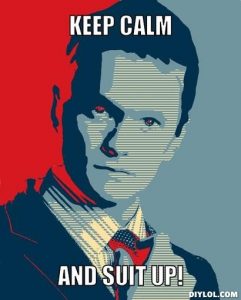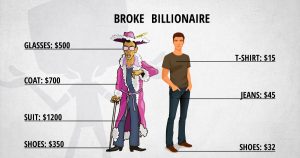In many aspects of the personal and professional world, visual impressions matter. Appearing to own expensive clothes, cars, or cellphones may seem shallow, but we are hardwired to express ourselves to signal status, group membership, individuality, or style. The expressions and responses to the way we showcase ourselves in public determine the two-fold relationship between our internal selves and our relationships with others.

Source: diylol.com via Pinterest
Barney Stinson was right to feel powerful when following the mantra to always wear a suit. Just as the show, How I Met Your Mother, displays Stinson’s personality shift from confident and ambitious while “suited up” to childish and insecure when dressed casually, real world situations are surprisingly similar. Researchers from Columbia University in New York and California State University have extensively proved that wearing formal clothing enhances abstract cognitive processing. All five studies within the paper show evidence that people feel more positive about themselves when wearing a suit or dress.
As we become more confident in how we look, we are able to transition more easily into roles that are unfamiliar by first dressing the part. Power roles known as powerful or wealthy in our modern society are perceived to be represented with people wearing suits or formal clothing. When we wear the clothes of people seen in power roles, we fit the mindset of what we see in them when in public. The theory here, known as Symbolic Interactionism, works on a subconscious level that matches our expectations of reality and success in the personal world we live in.

Source: AMC Opensource for Mad Men
Just as we judge ourselves, judging others aligns with our attention to expectations. When we are wearing formal clothing, we are more attentive to being in a cognitive position of power. Just as business people focus on connections and network value, we are more critical of the positions that other people fill when dressed in public. We are more open towards associating with people who are on a perceived equal level by the way they dress, regardless of the surroundings or occasion.

Source: Shutterstock Image Library
So is the solution for all of us to start wearing suits every time we leave the house to make ourselves feel better? The answer is not that simple. Psychology Today defines confidence as a belief in one’s ability to succeed. However, invoking confidence through symbolic measures, such as wearing a suit, can be an act of insecurity that masks the reality of incompetence.

Source: Getty Images
Especially when unsure of the ability to perform a role, appearing to be wealthy results in overcompensation that penalizes you in social situations. For instance, a trendsetting poor individual would feel the need to spend more money buying expensive accessories, where a self-confident wealthy individual would not focus on appearances and wear clothes that are more comfortable.
All in all, the clothes may make the person, but it’s the person wearing the clothes. Though there are benefits beyond how others see you, the truth of dressing to impress is that working toward your ideal role is equally important to how you appear to others. A suit and tie cannot solve all of your problems, but being honest with yourself just might.
– Aaron Yen





